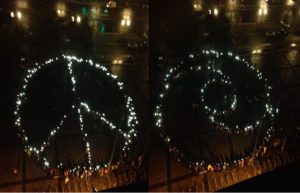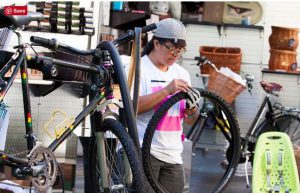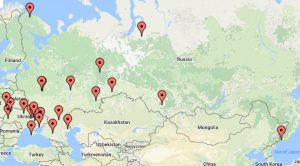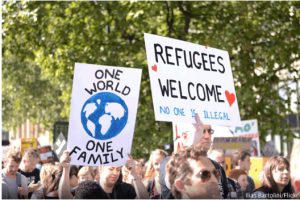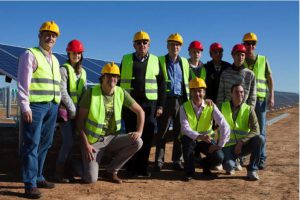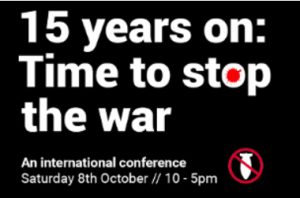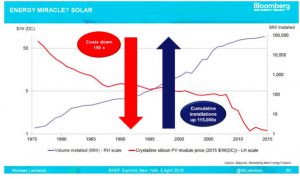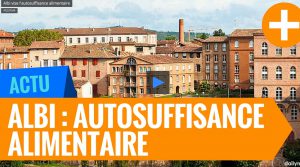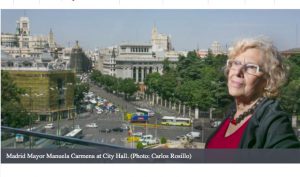FREE FLOW OF INFORMATION
A survey by CPNN
The following events were listed in “Google News” during the week of September 17-14 under the following key words:
“International day of peace”,
“Journée internationale de la paix,”
“Día Internacional de Paz,”
“Dia Internacional da Paz”
“Tag des Friedens”
“Friedenstags”
“Giornata Internazionale della Pace”
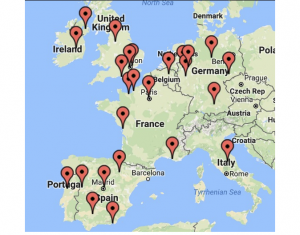
(Click on image to enlarge)
No doubt there were articles in other national languages that are not listed here. For events elsewhere in the world, click here.
As seen on the map above, there were articles about 29 events in 8 Western European countries found by this method.
Here are excerpts from the articles.
Assisi, Italy: “Thirst for Peace. “From 18 to 20 September 2016, more than 500 officials from nine major religions converged in Assisi, Italy, for an interreligious meeting organized under the auspices of the Community Santegidio. T hirty years after the historic initiative of John Paul II, Pope Francis celebrated the spirit of peace, with representatives of all other religions. An appeal signed by all participants at the end of the meeting, is reproduced here for the International Day of Peace.
Cervia, Italy: Cervia celebrated the International Day of Peace in cooperation with a Skype connection with the seat of Mayors for Peace in Hiroshima. The recall of the destruction of Hiroshima reverberated with the recent damage from the earthquake in Italy.
Banchette, Torino, Italy: The banner in the colors of Peace was launched into heaven, dragged up by a dozen white balloons, this morning by 200 elementary school students of the Walter Fillak school. The children engaged in the reading of poems and songs by Gianni Rodari, Gandhi, Nelson Mandela, stressing the importance of brotherhood and peace.
Ventimiglia, Italy: The pupils of the Nervia Primary school arranged themselves to form the peace symbol. A simple gesture, a representation, a thought, but effective to commemorate the International Day of Peace.
Roma, Italy: On the occasion of the International Day of Peace, the Austrian Forum of Culture in Rome announced the finalists for the best picture of peace, in the 2016 edition of the Alfred Fried Photography Award which was initiated in 2013 in collaboration with UNESCO.
Bonn, Germany In Bonn therre were many events for peace day, beginning on Tuesday evening with a discussion in the Old Town Hall about how civilian groups can participate better in peace negotiations.
Duisburg, Germany: The Explorado museum of Duisburg is one of five children museums from five countries taking part in an international art project. The project, presented on World Peace Day, includes screens painted by more than 300 children.
Augsburg, Germany: Numerous, people gathered on the Moritzplatz to launch balloons for peace. The idea for the campaign comes from the Catholic German Women’s Federation. “We want to set an example for humanity and peace,” said diocesan Chairman Ulrike Stowasser. “We want to show our solidarity for refugees and their volunteer helpers.”
Bergstadt, Germany: People gathered to mark the International Day of Peace in the marketplace. “We are a small club with 15 members,” said Lisa Interschick from the local peace movement, but she was pleased with the many visitors who had gathered to pray. During the event texts were presented on non-violence and reconciliation, as prayers for peace. All visitors were given a rose.
Hammersmith, England: White balloons bearing messages of peace and happiness were released in Hammersmith to mark the International Day of Peace. The special event, which was attended by school children and Hammersmith and Fulham mayor Mercy Umeh, took place in Lyric Square. Dozens of school kids from Phoenix High school, St Paul’s primary, Normand Croft, Larmenier and Sacred Heart and Brackenbury primary supported the event’s peace pledge by signing tags and attaching them to the balloons.
Lisburn, Northern Ireland: Around 3,500 young people from schools and youth clubs across Northern Ireland are attending an event in Lisburn, to coincide with the United Nations International Day of Peace. The Amazing the Space programme fused musical performances from local young people with messages from international speakers with experience of living in conflict zones. A further 1,500 people will attend similar events at five satellite venues in Ballymena, Londonderry, Enniskillen, Bessbrook and Magherafelt.
(Article continued in the right column)
Question for this article
What has happened this year (2016) for the International Day of Peace?
(Article continued from the left column)
Chigwell, England: Children at West Hatch High School in Chigwell took part in assemblies on issues such as the suffering caused by war, and pupils wrote messages on a ‘Tree of Peace’ in the school’s entrance hall to the victims of conflict. Organiser and school counsellor Sarah O’Donnell said: “Peace every day is the goal but focussing on a particular day is helpful for us all: peacefulness is important in our own lives, in our families, at work, in school and in our wider social lives.”
Isle of Wight, England: Doves were released in St Thomas’ Square by Sunrise Vectis Rotary, and a prayer was said by Rev Janet Hallam. Pauline Martin, who was one of those behind the gathering, said: “As the Rotary is an international group, it’s great to mark the day and raise awareness, especially considering events happening in today’s world.”
Oldham, UK: The Oldham Council organized a series of events to engage the public, schools, the community, faith groups and businesses in Oldham. The council became the first local authority in the UK to sign the Pledge to Peace in 2015; a commitment to put in place projects and actions promoting a culture of peace in the borough. Since then 13 local organisations have joined in signing the pledge and formed the Oldham Pledge to Peace Forum.
Portlaoise, Ireland: The Portlaoise Parish parish hosted an interfaith prayer service for members of the Hindu, Jewish, Muslim, Sikh, Baha’i, Bhuddist and Christian faiths.
Marseilles, France: On September 24, the International Day of Peace will resound on the Old Port of Marseilles when a collective of twenty associations state an emergency “march for peace”.
Gennevillers, France: Rainbow rainbow streamers, cardboard doves and optimism. On the occasion of the International Day of Peace, dozens of children from Gennevilliers leisure centers massed on the steps of City Hall. They raised the flag of peace and read messages of hope to send to the children of the sister cities of Gennevilliers.
Gonfreville-l’Orcher, Normandy, France: On the occasion of the International Day of Peace, the City of Gonfreville, member of the French Association of municipalities, departments and regions for Peace (AFCDRP) and the global network of Mayors for Peace ( “Mayors for Peace”) , invited the Hiroshima Junior Marimba Ensemble to give a concert for peace.
La Rochelle, France: The La Rochelle collective for diversity offers a day punctuated by meetings and workshops that will demonstrate that talent is stronger than discrimination! We are reminded that diversity and differences when they are accepted, respected and promoted are the force of our Republic and not a handicap.
Caen, France: The Movement for Peace and several associations including Hérouville-Esperanto an Pax Christi, organized 4 hours of discussions for peace in the Caen Memorial with the goal to promote a culture of peace.
Alpes du Sud, France: The Mouvement de la Paix organized for the International Day of Peace, videos, discussions, and an all-day concert.
Molenbeek, Belgium: As part of the International Day of peace, the Foyer Molenbeek produced a video in which children talk about what peace means to them.
Alcobendas, España: Padre Angel, president of Messengers of Peace,and the Mayor of Alcobendas were present at the Peace Day ceremony along with other officials and dignitaries. The Mayor renewed the commitment of Alcobendas “to work for peace and use all means at our disposal to ensure the best horizon for future generations” and ended his words with a quote from Benjamin Franklin: “We must all walk together towards peace or we’ll never find it.”
Tudela, Navarra, España: The Government of Navarra commemorated the International Day of Peace with an official ceremony to recognize the work of forensic anthropologist Paco Etxeberria and the memorialist associations for having developed “an important role in the exhumation of the victims of 1936.”
Ciudad Rodrigo, Salamanca, España: Murals for peace: In the Institute for Secondary Education Fray Diego Tadeo of Ciudad Rodrigo two large panels were made available for all members of the educational community to put sentences or drawings related to peace.
Maspalomas, Canrias, España: This tourist resort celebrated International Day of Peace and its recent nomination as a Rotary Peace City. This award is the first to be granted to a Spanish city, and the fourth in Europe after Jersey (Great Britain), Cannes (France) and Zenna (Serbia).
Posadas, Córdoba, España: Teachers and students from different schools of Posadas made a peace walk. According to Estela Martinez, Director of Misiones Cuatro, “We decided to do this walk for kids to demonstrate the value of peace, a value for we have worked since childhood, for respect, for love, and for fellowship without violence or bullying,
Mealhada, Aveiro, Portugal: On the occasion of the International Peace Day children from the Children’s House and users of the Santa Casa da Misericordia distributed white flowers as a symbol of peace on the local streets and shops of the city of Aveiro.
Almería, Spain: The NGO Movement for Peace was launched today, coinciding with the International Day of Peace. It is a new campaign whose main objective is to commemorate this day remembering that thousands of people around the world pass this day without having the full right to peace. They are launching an initiative for microdonations for the maintenance of a mobile clinic for disabled Syrian refugees in Lebanon.
